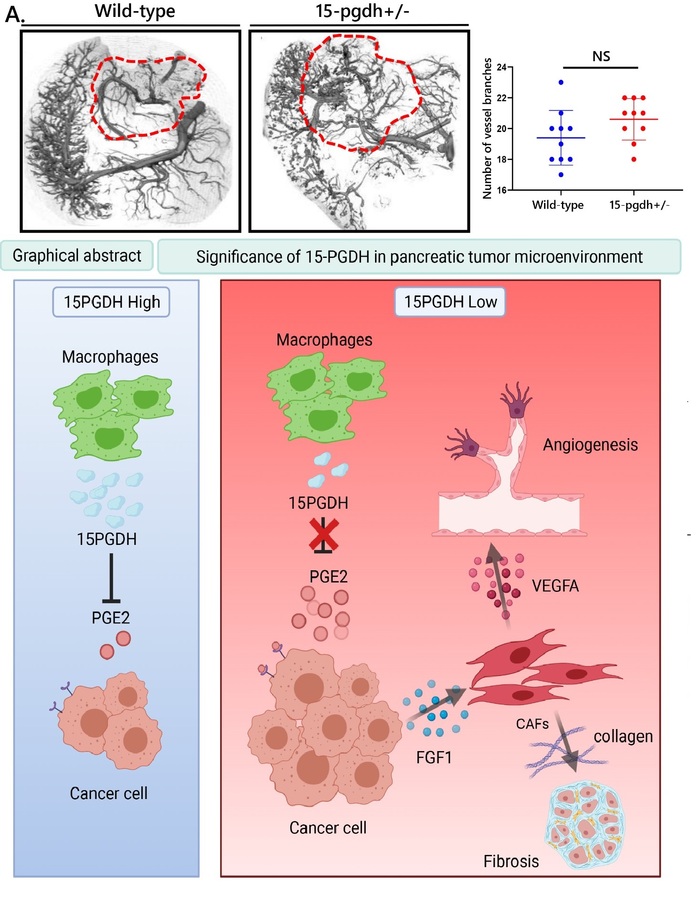- HOME
- News & Events
- Publications
- 【Publications】Tumor microenvironmental 15-PGDH depletion promotes fibrotic tumor formation and angio...
Publications
【Publications】Tumor microenvironmental 15-PGDH depletion promotes fibrotic tumor formation and angiogenesis in pancreatic cancer
September 14 2022
Takatsugu Ishimoto
Paper information
Title:
Tumor microenvironmental 15-PGDH depletion promotes fibrotic tumor formation and angiogenesis in pancreatic cancer
Luke Bu, Atsuko Yonemura, Noriko Yasuda-Yoshihara, Tomoyuki Uchihara, Galym Ismagulov, Sanae Takasugi, Tadahito Yasuda, Yuya Okamoto, Fumimasa Kitamura, Takahiko Akiyama, Kota Arima, Rumi Itoyama, Jun Zhang, Lingfeng Fu, Xichen Hu, Feng Wei, Yuichiro Arima, Toshiro Moroishi, Koichi Nishiyama, Guojun Sheng, Toshifumi Mukunoki, Jun Otani, Hideo Baba, Takatsugu Ishimoto*(*corresponding author)
Cancer Sci 2022 Jul 18. doi: 10.1111/cas.15495.
Highlights
- 15pgdh was dominantly expressed by macrophages in pancreatic tumor microenvironment.
- 15pgdh depletion results in PGE2 accumulation which leads to fibrosis and angiogenesis in murine pancreatic tumor transplantation model.
- PGE2 activates FGF1-FGFR signaling pathway promotes cancer associated fibroblasts proliferation.
- Depletion of cancer associated fibroblast suppresses angiogenesis and fibrosis in pancreatic tumor microenvironments.
Abstract
The arachidonic acid cascade is a major inflammatory pathway that produces prostaglandin E2 (PGE2). Although inhibition of 15-hydroxyprostaglandin dehydrogenase (15-PGDH) is reported to lead to PGE2 accumulation, the role of 15-PGDH expression in the tumor microenvironment remains unclear. We utilized Panc02 murine pancreatic cancer cells for orthotopic transplantation into wild-type and 15-pgdh+/- mice and found that 15-pgdh depletion in the tumor microenvironment leads to enhanced tumorigenesis accompanied by an increase in cancer-associated fibroblasts (CAFs) and the promotion of fibrosis. The fibrotic tumor microenvironment is widely considered to be hypovascular; however, we found that the angiogenesis level is maintained in 15-pgdh+/- mice, and these alterations were also observed in a genetically engineered PDAC mouse model. Further confirmation revealed that fibroblast growth factor 1 (FGF1) is secreted by pancreatic cancer cells after PGE2 stimulation, consequently promoting CAF proliferation and vascular endothelial growth factor A (VEGFA) expression in the tumor microenvironment. Finally, in 15-pgdh+/-Acta2-TK mice, depletion of fibroblasts inhibited angiogenesis and cancer cell viability in orthotopically transplanted tumors. These findings highlighted the role of 15-pgdh downregulation in enhancing PGE2 accumulation in the pancreatic tumor microenvironment and in subsequently maintaining the angiogenesis level in fibrotic tumors along with CAF expansion.
Representative Figure

